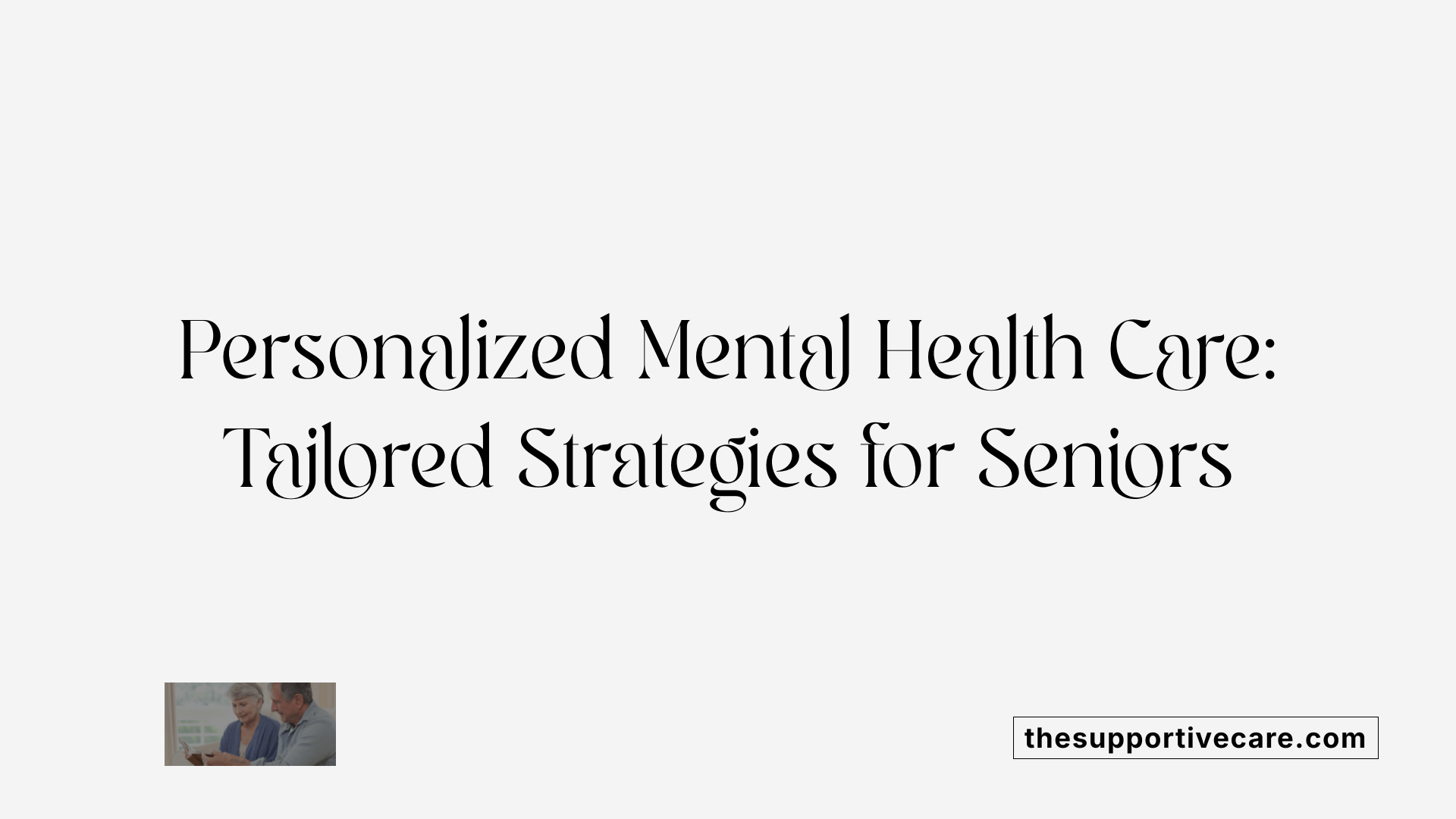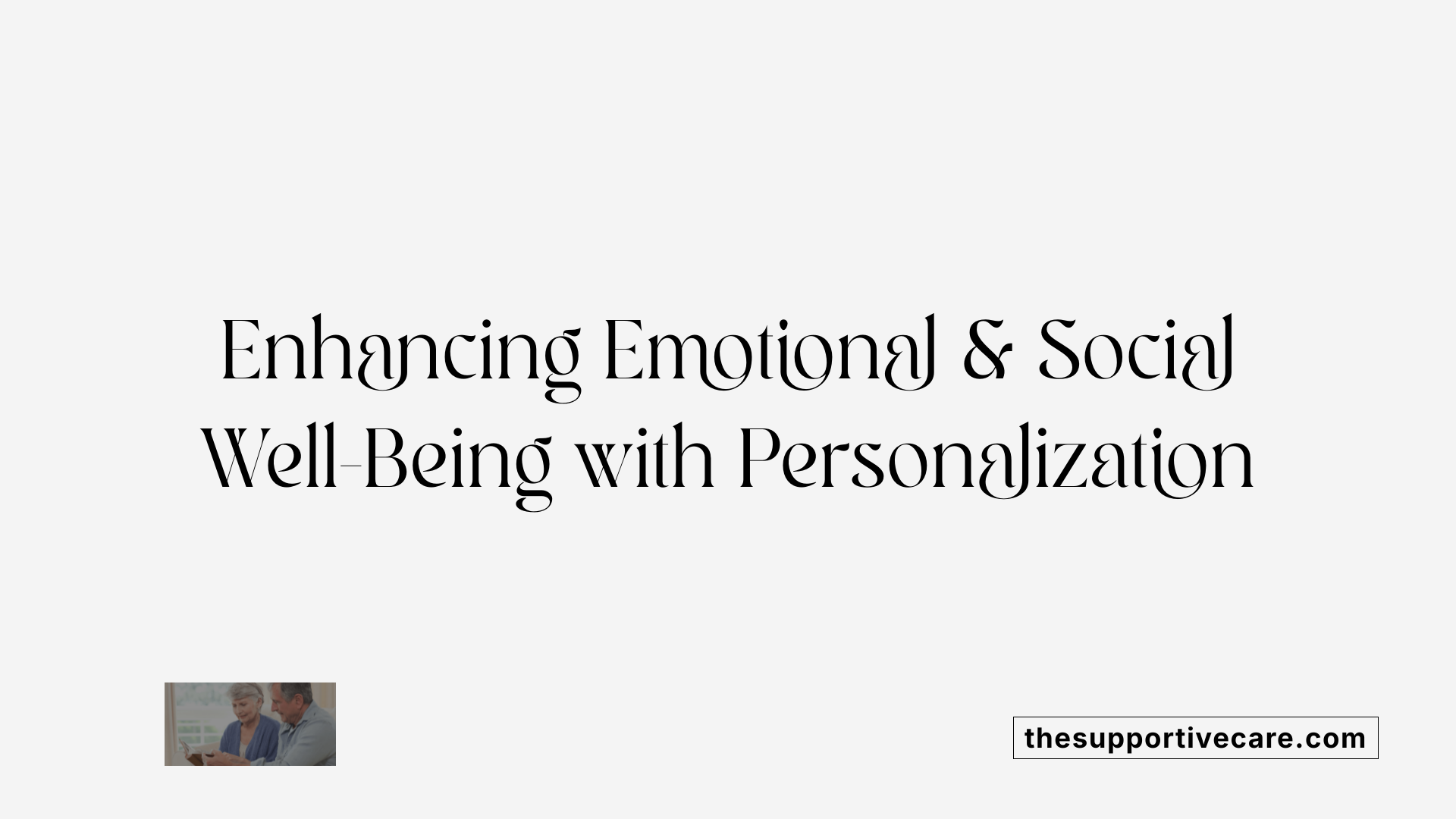Understanding the Importance of Tailored Mental Health Strategies for Older Adults
As the global population ages, creating effective and personalized mental health care plans for seniors has become crucial. These plans not only address the unique needs of each individual but also promote independence, dignity, and improved quality of life. This article explores systematic approaches, key components, assessment techniques, and best practices for developing and maintaining such plans, ensuring that elderly individuals receive holistic and responsive care.
Fundamentals of Personalized Mental Health Care Planning for Seniors

What are the key components and benefits of personalized mental health care planning for elderly individuals?
Personalized mental health care plans for seniors are designed to meet the unique needs of each individual through comprehensive assessments and tailored interventions. The process begins with evaluating the senior’s mental, physical, social, spiritual, and environmental health. This thorough assessment helps identify strengths and challenges, guiding the development of appropriate strategies.
A multidisciplinary team approach is fundamental, involving healthcare providers, mental health specialists, family members, and caregivers. These diverse perspectives ensure that all aspects of the senior’s well-being are considered, from medical treatment to social engagement. Safety modifications in the home, such as grab bars or assistive devices, are included to prevent accidents and promote independence.
Social connection initiatives, like participation in community groups or hobbies, are essential to reduce loneliness and stigma, which are common concerns in older adults. Continuous reassessment allows the care plan to adapt to changing health conditions, preferences, or circumstances.
The advantages of personalized mental health planning are extensive. They include improved adherence to treatment, better management of multiple health issues, heightened emotional well-being, and increased independence. Furthermore, integrating personal preferences boosts engagement and satisfaction.
Addressing social determinants such as social isolation and cultural background fosters a supportive environment that promotes resilience. Overall, personalized plans facilitate holistic, flexible care that supports seniors in aging with dignity, autonomy, and mental resilience.
| Assessment Components | Intervention Focus | Involvement Sources |
|---|---|---|
| Medical history, medications | Therapy, medication management | Healthcare providers, family |
| Cognitive and emotional health | Social activities, counseling | Community groups, mental health specialists |
| Home safety and mobility | Home modifications, physical activity | Caregivers, safety experts |
| Social engagement and community participation | Hobbies, support groups | Family, community organizations |
| Personal preferences, strengths | Support networks, tailored routines | Senior themselves, family |
| Regular reassessments | Plan updates | Healthcare team, senior |
Implementing Structured Assessment Techniques for Seniors' Mental Health Needs
To effectively support seniors' mental health, healthcare providers must employ structured assessment techniques that enable collaborative care planning.
Use of standardized screening tools is vital in identifying mental health issues early and accurately. Commonly employed instruments include the PHQ-9 for depression, GAD-7 for anxiety, and the Geriatric Depression Scale. Cognitive screenings like the Mini-Cog or MMSE are also essential to assess memory and cognitive function.
In addition to screening tools, multidisciplinary assessments that evaluate physical health, functional capacity, social environment, and substance use provide a comprehensive picture of the senior's needs. Tools such as the WHO Disability Assessment Schedule (WHODAS 2.0) help gauge daily functioning.
Engagement with family members and caregivers enhances understanding and supports ongoing monitoring. Regular biweekly evaluations, whether through home visits or telephone follow-ups, track treatment response and adjust care plans accordingly.
A collaborative care approach involves a team of professionals—geriatricians, psychiatrists, and care managers—who work together to review case details systematically. Communication with primary care providers ensures continuity and consistency in treatment.
Measurement-based care utilizes symptom rating scales consistently to assess effectiveness and safety of interventions, facilitating timely modifications.
Implementing these strategies ensures that assessment of seniors' mental health is thorough, dynamic, and personalized, promoting better health outcomes and a higher quality of life for older adults.
Best Practices for Sustaining Personalized Mental Health Strategies in Elder Care
How can a collaborative approach enhance the implementation of mental health care plans for seniors?
Implementing effective mental health strategies for seniors greatly benefits from a collaborative approach. This involves engaging the senior, their family members, healthcare providers, mental health professionals, and caregivers in all stages of planning and care delivery. Such teamwork ensures that the care plan reflects the individual’s preferences, cultural background, and specific needs. It promotes shared decision-making, fosters trust, and improves adherence to the care plan.
Why are routine updates important for personalized elder care plans?
Elderly individuals often experience changes in health, mobility, cognitive function, and emotional well-being. Regular assessments and updates to the care plan are essential to adapt to these evolving needs. Routine reviews help identify new challenges, adjust interventions, and ensure medications, social activities, and therapies remain appropriate. Consistent monitoring supports continuous improvement in mental health and overall quality of life.
How do integrated care teams contribute to successful mental health management?
An integrated care team includes medical doctors, mental health specialists, social workers, and community resources, working cohesively to coordinate care. Such multidisciplinary teams enable comprehensive assessments, simultaneous management of physical and psychological health, and seamless communication. This holistic approach minimizes gaps in care, reduces hospitalizations, and enhances seniors' independence by offering personalized, well-rounded support.
What role does technology play in maintaining and improving mental wellness plans?
Innovative technology tools such as telepsychiatry, mobile health applications, and electronic health records greatly enhance elder care. They facilitate remote consultations, real-time monitoring, and personalized interventions, making mental health services more accessible, especially for mobility-challenged seniors or those in remote areas. Tech solutions also support data collection, enabling healthcare providers to track progress, adjust treatments, and engage seniors actively in their care routines.
| Practice Area | Benefits | Tools & Examples |
|---|---|---|
| Collaboration | Better personalized care, increased adherence | Family meetings, care coordinators |
| Routine updates | Adaptation to health changes, improved outcomes | Regular assessments, telehealth check-ins |
| Integrated teams | Holistic health management, reduced gaps | Multidisciplinary clinics, case conferences |
| Use of technology | Increased accessibility, better monitoring | Telepsychiatry platforms, health apps |
Employing these best practices ensures that mental health care for seniors is dynamic, responsive, and centered on their unique needs, ultimately fostering greater well-being and independence.
Developing Effective Mental Health Strategies Based on Evidence-Based Approaches
How can evidence-based methods and systematic approaches be used to develop effective mental health strategies for seniors?
Creating impactful mental health programs for seniors relies on integrating strong scientific research with practical, coordinated care models. Evidence-based methods, including meta-analyses, clinical guidelines, and expert consensus, form a foundation for developing strategies that have proven effectiveness.
Systematic reviews of research consolidate findings from various studies, helping clinicians and policymakers identify what treatments and interventions work best. For example, robust evidence indicates that combined pharmacological and psychosocial treatments can significantly improve mental health in conditions like depression and dementia.
Multidisciplinary collaboration enhances these efforts by bringing together healthcare providers, mental health specialists, social workers, and community organizations. This team-based approach ensures that care plans are holistic, addressing medical, emotional, social, and cognitive needs.
Decision support tools, such as clinical reminders and digital platforms, assist healthcare professionals in applying current best practices consistently. These tools help streamline assessments, monitor progress, and adjust treatments, making the process more efficient and effective.
Addressing social determinants of health—factors like income, social support, housing, and access to healthcare—is crucial in designing comprehensive mental health strategies. Recognizing and mitigating these influences can significantly improve outcomes by reducing barriers to care.
Innovative models, such as telehealth services and integrated care systems, facilitate access and ensure continuous support, especially important for seniors with mobility issues or those living in remote areas.
Ultimately, adopting a systematic, evidence-based approach that emphasizes collaboration, technological support, and social context leads to more effective mental health strategies that improve quality of life for seniors.
Creating a Supportive Environment for Seniors’ Mental Wellness

What are effective strategies for developing individualized mental health care plans for seniors?
Developing personalized mental health care plans for seniors begins with thorough assessments of their current mental and physical health. This process involves understanding their strengths, values, and personal goals, which serve as a foundation for tailored interventions.
Collaboration is crucial. Healthcare providers, seniors, and their family members should work together to establish realistic objectives that respect the individual's cultural, social, and generational backgrounds. Including evidence-based practices such as behavioral activation, mindfulness, and social engagement can significantly boost mood and emotional well-being.
To ensure the plan remains relevant, regular monitoring and updates are necessary. Using tools like mental wellness plans, activity assessments, and culturally responsive practices helps keep the strategy aligned with the senior’s evolving needs.
Creating a supportive environment also involves modifying living spaces for safety, encouraging social activities to prevent loneliness, involving family and community, and initiating emotional well-being programs. These combined efforts foster a holistic approach to maintaining mental health and improving quality of life for seniors.
Facilitating Emotional and Social Well-being through Personalization
 Supporting emotional and social well-being in seniors through personalized care plans plays a crucial role in enhancing their quality of life. One of the primary aspects is addressing loneliness and stigma. Creating a safe, inclusive environment encourages seniors to feel accepted and valued, which helps to reduce feelings of isolation.
Supporting emotional and social well-being in seniors through personalized care plans plays a crucial role in enhancing their quality of life. One of the primary aspects is addressing loneliness and stigma. Creating a safe, inclusive environment encourages seniors to feel accepted and valued, which helps to reduce feelings of isolation.
Facilitating regular visits from family, friends, and community members fosters meaningful social bonds and provides emotional reassurance. Incorporating hobbies such as gardening, music, or crafting that align with the senior’s interests not only promotes engagement but also helps instill a sense of purpose and joy.
Building supportive relationships with caregivers is essential. When caregivers understand an individual’s history and preferences, they can offer personalized support that respects the senior’s dignity and confidence. Additionally, involving peer support groups and community programs can further reduce loneliness and encourage social interaction.
Overall, integrating opportunities for emotional stability and social connection within care plans is vital. These strategies contribute significantly to mental health, helping seniors maintain a sense of belonging, purpose, and happiness.
Safety Measures and Emergency Planning in Personalized Care Strategies
What safety considerations should be included in personalized mental health care plans for seniors?
Ensuring safety is a vital part of a comprehensive care approach for older adults. Personalizing safety measures helps prevent accidents and supports mental well-being.
One of the primary safety steps involves home safety modifications. Installing grab bars in bathrooms, especially near toilets and showers, can prevent falls. Removing tripping hazards like loose rugs or clutter and ensuring adequate lighting throughout the house reduces the risk of accidents.
Emergency preparedness is equally important. Developing a clear plan that includes accessible emergency contacts, local emergency services, and family members is essential. Seniors should have vital information—such as medical records, medication lists, allergies, and healthcare directives—organized and easy to access. This documentation ensures quick response in case of emergencies.
Home adaptations tailored to different mobility challenges can significantly improve safety and independence. Features such as stair lifts, walk-in showers, and non-slip flooring provide extra security and make daily activities manageable.
Regular safety assessments conducted by healthcare professionals or home safety experts can help identify potential hazards. These evaluations promote an environment that minimizes injury risk and supports mental and physical health.
Incorporating these safety measures into personalized care plans not only enhances physical security but also fosters emotional stability, helping seniors feel more confident and secure in their daily lives.
Legal and Practical Considerations in Senior Mental Healthcare

What legal and financial planning elements are essential in creating mental health care plans for seniors?
Legal and financial preparations are crucial for ensuring effective mental healthcare for seniors. Established legal documents such as wills, powers of attorney, healthcare proxies, and living wills are vital. These documents help ensure that a senior's wishes are respected and that trusted individuals are appointed to make decisions on their behalf if needed.
Financial planning plays an equally important role. It involves budgeting for ongoing care costs, understanding insurance coverage, and managing resources to support long-term needs. Proper financial planning helps prevent unexpected expenses and ensures consistent access to necessary services.
Documentation needs to be regularly reviewed and updated to reflect changes in health, preferences, or circumstances. Collaborating with legal and financial professionals can help seniors navigate complex regulations and secure their financial future.
Incorporating these elements into a care plan provides peace of mind for families and helps maintain the senior’s dignity, independence, and quality of life. Proper planning reduces stress during emergencies and ensures that care decisions align with the senior’s wishes, fostering a respectful and supportive care environment.
The Role of Caregivers and Technology in Supporting Mental Wellness
 Caregivers are essential in shaping and executing mental health care plans for seniors. Their roles include providing emotional support, managing medications, assisting with daily routines, and closely monitoring the senior's health conditions.
Caregivers are essential in shaping and executing mental health care plans for seniors. Their roles include providing emotional support, managing medications, assisting with daily routines, and closely monitoring the senior's health conditions.
Proper training and ongoing support empower caregivers to effectively respond to the dynamic needs of seniors. This collaboration with healthcare professionals ensures that care strategies remain effective and personalized.
The integration of technology further strengthens this support system. Telehealth platforms allow caregivers and seniors to have regular virtual consultations with healthcare providers, making it easier to manage treatment plans and address concerns promptly.
Mobile health (mHealth) tools, such as health apps and remote monitoring devices, enable continuous tracking of symptoms, medication adherence, and overall well-being. These technologies can alert caregivers or healthcare teams to any changes that require attention, preventing potential crises.
Tools like Carepatron, Quenza, and SimplePractice support personalized interventions, educational resources, and the management of care routines. They help organize treatment plans, document progress, and facilitate communication between seniors, caregivers, and professionals.
The combination of caregiver involvement and technology-enabled monitoring leads to improved health outcomes. It reduces unnecessary hospital visits, supports early intervention, and helps seniors maintain independence and emotional stability.
Overall, leveraging caregiver expertise alongside innovative digital tools ensures a comprehensive, proactive approach to mental wellness, promoting a better quality of life for seniors.
Moving Towards Holistic and Responsive Senior Care
Creating individualized mental health care plans for seniors involves a comprehensive, collaborative, and evidence-based approach that addresses medical, emotional, social, and environmental needs. By systematically assessing needs, engaging multidisciplinary teams, leveraging technology, and prioritizing safety and legal considerations, caregivers and healthcare providers can improve health outcomes and quality of life. Regular review, ongoing support, and adaptation to changing circumstances are essential to ensure these plans remain effective and relevant. Ultimately, personalized mental health strategies empower seniors to maintain independence, dignity, and emotional resilience as they age.
References
- Creating a Mental Wellness Plan for Seniors - Keystone Health
- How to Create a Personalized Care Plan for Seniors in 7 ...
- Personalised care planning for adults with chronic or long‐ ...
- Steps for Creating and Maintaining a Care Plan | Caregiving
- Creating Personalized Care Plans For Mental Health
- How Personalized Care Plans Improve Quality of Life for ...
- Creating a Personalized Care Plan for Senior Loved Ones
- How Personalized Care Plans Improve the Resident ...


































































































